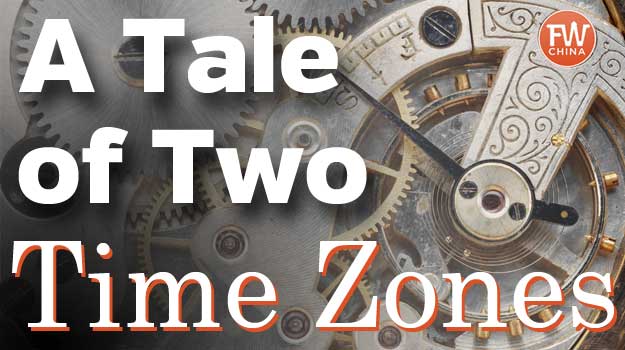In Kashgar, an ancient Silk Road town on the western edge of Xinjiang, one man wakes up at 9am on a chilly January morning to prepare for the day. Three thousand miles away, the city of Beijing is already busy at work, but here in Kashgar very few residents are stirring.
Why bother? The sun isn’t going to rise for another hour and fifteen minutes, at 10:15am.
In Urumqi, the capital of Xinjiang, another man boards an airplane headed to Almaty in Kazakhstan. A look at his flight ticket shows that he is scheduled to leave at 9pm. Somehow, the flight will land in Kazakhstan an hour and a half later…at 8:30pm.
There are very few places in the world today where a question as simple as “What time is it?” must often be accompanied by a qualifier: “Beijing time or Xinjiang time?”
Living in Two Time Zones
It’s a well-known fact that the Xinjiang region in China operates on a two-time zone system: the official “Beijing Time” and the unofficial “Xinjiang time” or “local time” which is two hours behind.
The use of Xinjiang time, although practical in some cases, is often a minor form of rebellion for a portion of the local Uyghur population. As a long-time resident of Xinjiang I’ve learned to live with the inconvenience of the two-time zone system but it didn’t come without plenty of frustration.
I can’t even count the number of times I’ve arranged to meet with somebody – this usually happens with other foreigners – only to find that there was a two-hour difference between when we both expected to arrive at the same location. The ensuing conversation usually goes something like “I’m sorry! I just assumed you were going on local time/Beijing time…”
You would imagine that clarifying the time zone would help but even that doesn’t always do the trick.
Here’s how you spot a seasoned Xinjiang expat: a seasoned expat will text you 30 minutes before the scheduled meeting time to ask “So I’ll see you in half an hour?” It’s a very polite way of making sure that we’re both on the same page regarding time.
Time Zones in China?
Technically speaking, China should be divided into five time zones where Kashgar is two and a half hours behind Beijing. That’s the way it used to be between 1912 and 1949.
It wasn’t until after the Chinese Civil War in 1949 that a single time zone was implemented.
That was more than 60 years ago. I have yet to meet anyone here in Xinjiang who remembers living under a different time zone. Perhaps that’s because when the clocks changed in 1949, daily life stayed the same.
Banks, schools, government offices and most shops still start their day at 8am local time just like most everywhere else in the world. The only difference is that the clock says that it’s officially 10am. We all break for lunch between noon and 1pm even though our watches may say 2pm or 3pm.
And everybody still despises 5 o’clock traffic…at 7pm.
Mixing Politics with Time
Despite how it sounds, people of every ethnic group in Xinjiang spend very little time thinking about time zones. Sure, I’ve had conversations with good Uyghur friends who expressed their resentment toward the imposed time zone. We talked about it once and it never came up again.
I once read in reference to Xinjiang time that “Friendships are won or lost on the basis of the hands on your watch.” In my opinion, this simplistic view tends to overstate the importance of time within the broader issue of ethnic tensions.
Besides, it’s not just two ethnic groups that are at odds over the time. Some companies have decided to get in on the action.
I landed at the Urumqi airport last week, back from a nice vacation outside the country. I turned on my iPhone to get caught up on any messages I had missed and was met by a lock screen displaying Xinjiang time in large block numbers.
When I navigated to my Time & Date settings on the phone I realized that even though I had asked my phone to set time automatically, Apple had decided that my location was in the “Urumqi” time zone – one that according to Beijing doesn’t officially exist.
It’s not just a specific ethnic group or the sun that defies Beijing’s time zone. Apparently my phone does, too.
A Note to Travelers
As a postscript to this article, I did want to address the confusion I know that a lot of travelers experience when they come to Xinjiang. Should you set your watch to Beijing time or Xinjiang time?
Here’s my two cents: if I were you, I would set my watch to Beijing time just because any transportation you use – from buses to trains to airplanes – run on official time. It’s better to be on time for these departures than trying to “be local”. Contrary to the quote mentioned above, you won’t lose any friends for doing this!
Just keep in mind that generally speaking, most Han Chinese will speak to you using Beijing time while the Uyghur, particularly in southern Xinjiang, will speak to you in local Xinjiang time. Always clarify, of course, with a simple “北京时或新疆时?” (Beijing or Xinjiang time?)



